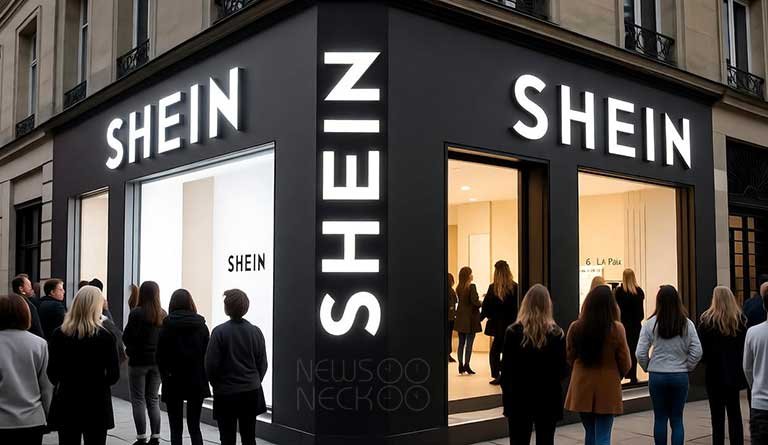Shein Comes to Paris, and a Fashion Rebellion Begins
In the heart of Paris, atop the historic BHV Marais department store, a battle is brewing over the soul of French fashion. Shein, the Chinese ultra-fast-fashion giant known for its impossibly cheap clothing, is preparing to open its first permanent physical stores there and in five other French cities this November.
The company calls it an “homage” to France’s status as a global fashion capital. But to many Parisians, it feels less like an honor and more like an invasion. The announcement has sparked a fierce backlash, uniting politicians, store employees, and iconic French brands in a protest against a business model they see as the very peak of disposable culture.
A Clash of Values in the City of Light
The scene at BHV Marais has turned from commerce to conflict. Employees, who normally staff the cash registers, have instead walked out to protest the new 1,000-square-meter Shein boutique set to open on the store’s sixth floor. An online petition against the move gathered nearly 100,000 signatures in just one week.
“Shein goes against our beliefs,” said one protesting employee, who asked not to be named. “We have always been a beautiful store with beautiful brands, and we try to promote corporate social responsibility”.
The parent company of the famous Galeries Lafayette franchise stores, which will also house some of the Shein locations, expressed its “profound disagreement” with the decision, calling Shein’s practices “incompatible” with its premium brand. In a powerful show of defiance, French specialty brands, including organic skincare line Aime and lingerie brand Le Slip Francais, have begun pulling their products from the department store in protest.
The “Ultra-Fast” Machine Under the Microscope
So, what is it about Shein that has caused such a stir? The answer lies in its “ultra-fast” business model. While traditional retailers like H&M might introduce 25,000 new items a year, Shein leaves them in the dust, listing a staggering 1.3 million items in the same time . On any given day, it can add between 2,000 and 10,000 new styles to its app.
This breakneck speed is powered by a system that tests small batches of clothing online and then rapidly scales up production for popular items. The result is a constant churn of new micro-trends, from “balletcore” to “mermaidcore,” delivered directly from factories in China to consumers’ doors.
But this model has a dark side, one documented by journalists and watchdog groups. Investigations have revealed that workers in Shein’s supply chain work up to 75-hour weeks, with only one day off per month, in direct violation of Chinese labor laws. These workers can be paid as little as 3 pence per item—the price of a few coins for a T-shirt.
You Might Like it: Shein’s French Store Debut Meets Fury
More Than a Labor Issue: A Planetary One
The problems continue after the factories. The fashion industry is the second-biggest consumer of water globally and is responsible for about 10% of the world’s carbon emissions—more than all international flights and maritime shipping combined.
Shein’s relentless production pace worsens this crisis. The company’s clothes are often made from synthetic fabrics like polyester, which are derived from plastic and shed harmful microfibers into our oceans with every wash . The industry produces a shocking 500,000 tons of these microfibers annually, equal to 50 billion plastic bottles.
Perhaps the most damning statistic is this: the equivalent of one garbage truck of clothes is burned or dumped in a landfill every single second . With Shein encouraging a culture of disposable fashion, where a dress might be worn only once, this mountain of waste only grows higher.
Why Shoppers Aren’t Walking Away
Despite the backlash, Shein’s sales continue to soar. The company’s global sales are estimated to have reached a colossal $36.9 billion last year . For many young consumers, the low prices are too good to resist.
“You can almost always find what you’re looking for, even if the quality is bad,” says Emily, 21, who spends around £20 a month on Shein for party and holiday outfits. She has considered stopping but finds other retailers “way too expensive”.
This highlights the central conflict: in a time of economic uncertainty, affordability often trumps ethics. As one analyst noted, the pressure on young people to wear new outfits for social media, combined with their limited budgets, makes Shein a hard habit to break.
A Government Pushes Back
France is not taking this lying down. In a bold move, the French Senate recently passed an “anti-Shein” measure that would slap taxes of up to 10 euros on every cheap garment sold by online giants like Shein and its competitor, Temu . The proposed law would also ban their advertising and require them to report the environmental impact of their clothing.
Paris Mayor Anne Hidalgo has been unequivocal, declaring, “Paris denounces the establishment of Shein, a symbol of fast fashion”.
The story of Shein’s Parisian store is more than a business news item. It is a global showdown over what we value. It asks whether the true cost of a £5 shirt is measured only in coins, or in the health of our planet and the dignity of its workers. As the doors prepare to open in November, the world will be watching to see if the city of light embraces this new retailer or shows it the door.
Author: Yasir Khan
Date: 12 Oct, 2025
For More Visit: NewsNeck













